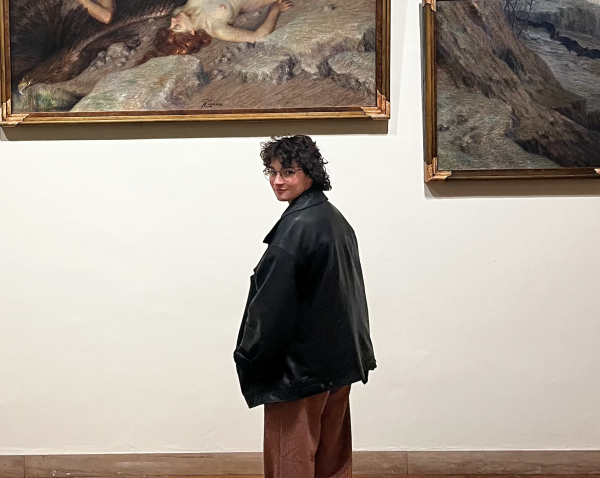MCSG Observer: LB talks supporting Muslim students

February 9, 2023
On Tuesday, Feb. 7, Macalester College Student Government (MCSG) convened in the Harmon Room of the DeWitt Wallace Library. The Legislative Body (LB) spent the first part of their meeting discussing how MCSG can support Muslim students and the second half discussing legislative restructuring.
Following recent events related to the temporary pause and reopening of the Taravat Talepasand exhibition in the Law Warschaw Gallery, the LB invited a student guest who is active in Macalester’s Muslim community to their meeting with the intention of centering Muslim students’ perspectives. This student guest wishes to remain anonymous.
“This incident with the gallery, I think, is just a small part of a greater conversation that we have to have about Macalester supporting students,” the student said. “Something that I want to make sure is set as a ground base is that I think there was a lot of harm that resulted from this gallery. Sometimes it’s hard for people to understand why or the extent of that [harm]. But no matter what people’s position or opinion is on the gallery, there was harm done to people who believe the gallery should be taken down and [those who believe] it should be kept.”
The conversation began with a discussion surrounding on-campus dining accommodations for Muslim students as Ramadan approaches. In particular, the student emphasized the importance of having halal options and clear labeling.
“I think it starts with a conversation first about people understanding and learning about religious accommodations,” the student said. “I think what it means for food to be halal or not is widely misunderstood on this campus… I think it just starts with educating the higher ups of Cafe Mac and Bon Appétit about what it means to have halal food and then … providing those options regularly and not just during Ramadan.”
The student also mentioned the need for additional on-campus dining related accommodations for Muslim students, including greater flexibility in dining hall hours during Ramadan. They called for collaboration between Cafe Mac and the Center for Religious and Spiritual Life (CRSL) in order to strengthen support for Muslim students.
Following, the discussion turned to questions regarding ways in which the student body can show support for Muslim students.
“Especially during Ramadan, but also all times of the year, how can other students be more supportive?” sophomore representative Cooper Glick ’25 asked. “[To] people on the LB but also people outside of the LB, what are things that could help feel more including?”
In their response, the student advocated for further education across campus.
“I think … this campus in general has a lack of religious literacy, not just for Muslim students, but for Jewish, Christian and other faith-identifying people,” the student said. “I think people are just unaware of things that could potentially help or hurt members of different religious communities.”
“… I don’t know exactly what it looks like to increase religious literacy on this campus, but there’s some sort of informing professors or staff or students … I think it’s a much bigger conversation than just giving people a pamphlet saying ‘educate yourself,’” the student continued.
Highlighting the impact of community dialogue, the student suggested that MCSG, senior leadership or a collaboration between the two work to share information about religious observances and accommodations with those across campus as a means of increasing religious literacy.
They also added that student voices would be essential in this process of creating sustained discourse within the Macalester community and brought up the suggestion to aim for opening conversations up to more community members, rather than opting for selected committees. Ultimately, however, they explained that transparency was integral, regardless of where plans stood.
“Sharing ideas that we are working on and being open to hearing casual feedback, formal feedback, open to different spheres of communication throughout the process, I think it’s important because we might be aware of how long it took in the conversations, we’ve had to get to a certain point where we have something implemented, but other people might not see that process,” Vice President and Student Services and Relations Committee (SSRC) Chair Mathilda Barr ’25 said.
The group also considered the idea of a petition and other potential organizations and departments to connect with.
MCSG concluded their discussion with the invited student guest by reflecting on the value of student engagement in pushing for positive change.
“I think that, as far as the student body and especially people who are representing the student body [goes], continue to maintain that pressure and continue working for it, that would be very much appreciated,” the student said.
During the second half of the meeting, the LB turned their attention to potentially restructuring MCSG’s elected positions for the fall 2023 semester. Barr introduced and explained the motivations behind the initiative.
“If we can look at some of the weaknesses we have internally, within our structure, we can have a more smooth operation of MCSG that would allow us to benefit the student body, be better representatives, have more energy [and] be present and supportive in the way we signed up for,” Barr said.
Other reasons for restructuring included reducing burnout within the Executive Board, providing more accessible figures for constituents to connect with and increasing engagement with MCSG as student representatives themselves.
President Bobbie Pennington ’24 continued to explain two potential restructuring options, emphasizing that the two drafts do not represent the ideas of the entire LB. The drafts were created by MCSG’s Executive Board. A few LB members were able to give feedback at the MCSG retreat on Saturday, Feb. 4, but this meeting was the first time the drafts were presented to the LB as a whole.
Presenting the first proposed restructuring option, Pennington stated that the biggest change is that the SSRC Chair and Vice President would be different positions. The SSRC would also be renamed the Campus Partners & Services Committee, and the vice president would be renamed the Executive Vice President (EVP) of LB Operations, though it’s likely that names will change as the LB continues to revise the proposed drafts.
The EVP would serve as a “go-to person” for officers, as Pennington phrased it, and correspond with LB members to ensure consistent support and LB engagement.
The first proposed draft also contains a new Communications and Engagement Committee, which would focus on outreach and student engagement and be overseen by the president.
“If you think about engagement with the community, that is so many different things,” Pennington said. “So it’s got the social media and stuff that you think of immediately, or tabling … But there’s also a lot of other things you maybe don’t think about too much: engaging with campus committees … There’s a lot around filing and voter turnout that this committee could be promoting.”
MCSG officers such as Sustainability Officer, Community Engagement Officer and Diversity & Inclusion Officer currently report to the president. However, the second model involves having issue-based officers or liaisons report to the proposed Campus Partners & Services Committee. Pennington explained that this would allow MCSG to create more liaison positions and expand outreach across campus.
Because this restructuring initiative involves changing MCSG’s constitution, it must eventually be passed by Macalester’s Board of Trustees in order for the change to be ratified. According to Pennington, MCSG has two different avenues to move this change to the Board of Trustees.
Pennington stated that either 15% of the student body must sign a petition calling for the structural change, or two thirds of the LB must vote in favor of the structural change and then the student body can vote to accept or reject the change. In this second option Pennington discussed, if the majority of the students who vote to accept the change, the change will move to the Board of Trustees.
Pennington stated that it is unlikely that MCSG will be able to go through this process before the upcoming Board of Trustees meeting this February. Therefore, he hopes that the Board of Trustees will be able to ratify the change after MCSG holds its next elections.
If the student body accepts the proposed changes before the next election cycle, Pennington believes that candidates can run for unratified positions. If they do not, elected officials will simply change positions after the structural changes are potentially confirmed by the Board of Trustees.













